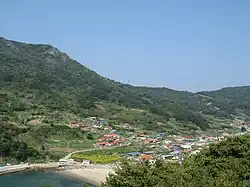Heuksando
Heuksando is an island in the Yellow Sea located off 97.2 km from the southwest coast of Mokpo, Jeollanam-do, South Korea. It covers an area of 19.7 km2 and consists of several peaks: Munamsan (문암산/門岩山 400m), Gitdaebong (깃대봉/깃대峰 378m), Seonyubong (선유봉/仙遊峰 300m), Sangnasan (상라산/象羅山 227m). It is within the administrative boundaries of Sinan County, Jeollanam-do, South Korea since 1969. The island's 19.7 km2 are home to about 3,133 people.[1]
Heuksando | |
|---|---|
| Korean transcription(s) | |
| • Hangul | 흑산도 |
| • Hanja | 黑山島 |
| • Revised Romanization | Heuksando |
| • McCune–Reischauer | Hŭksando |
 | |
| Country | South Korea |
| Area | |
| • Total | 19.7 km2 (7.6 sq mi) |
| Population (2001) | |
| • Total | 3,133 |
| • Density | 160/km2 (410/sq mi) |
Climate
| Climate data for Heuksando, Sinan (1997–2020 normals, extremes 1997–present) | |||||||||||||
|---|---|---|---|---|---|---|---|---|---|---|---|---|---|
| Month | Jan | Feb | Mar | Apr | May | Jun | Jul | Aug | Sep | Oct | Nov | Dec | Year |
| Record high °C (°F) | 16.5 (61.7) |
22.0 (71.6) |
23.3 (73.9) |
25.7 (78.3) |
28.8 (83.8) |
30.1 (86.2) |
32.8 (91.0) |
34.9 (94.8) |
31.1 (88.0) |
28.0 (82.4) |
22.6 (72.7) |
18.5 (65.3) |
34.9 (94.8) |
| Average high °C (°F) | 5.5 (41.9) |
6.5 (43.7) |
9.9 (49.8) |
14.5 (58.1) |
19.1 (66.4) |
22.8 (73.0) |
25.9 (78.6) |
27.9 (82.2) |
24.1 (75.4) |
19.4 (66.9) |
14.0 (57.2) |
8.2 (46.8) |
16.5 (61.7) |
| Daily mean °C (°F) | 3.4 (38.1) |
3.8 (38.8) |
6.5 (43.7) |
10.7 (51.3) |
15.2 (59.4) |
19.2 (66.6) |
22.9 (73.2) |
24.7 (76.5) |
21.3 (70.3) |
16.9 (62.4) |
11.5 (52.7) |
5.9 (42.6) |
13.5 (56.3) |
| Average low °C (°F) | 1.5 (34.7) |
1.8 (35.2) |
3.9 (39.0) |
7.8 (46.0) |
12.3 (54.1) |
16.6 (61.9) |
20.6 (69.1) |
22.5 (72.5) |
19.4 (66.9) |
15.1 (59.2) |
9.5 (49.1) |
3.9 (39.0) |
11.2 (52.2) |
| Record low °C (°F) | −8.7 (16.3) |
−5.9 (21.4) |
−3.9 (25.0) |
0.6 (33.1) |
6.3 (43.3) |
11.1 (52.0) |
15.6 (60.1) |
17.5 (63.5) |
14.8 (58.6) |
4.6 (40.3) |
−0.2 (31.6) |
−4.8 (23.4) |
−8.7 (16.3) |
| Average precipitation mm (inches) | 23.0 (0.91) |
32.8 (1.29) |
50.8 (2.00) |
88.8 (3.50) |
96.7 (3.81) |
157.5 (6.20) |
208.1 (8.19) |
211.2 (8.31) |
120.5 (4.74) |
58.7 (2.31) |
46.1 (1.81) |
33.1 (1.30) |
1,127.3 (44.38) |
| Average precipitation days (≥ 0.1 mm) | 9.2 | 7.5 | 7.8 | 8.9 | 8.2 | 9.5 | 12.5 | 11.5 | 9.4 | 6.6 | 8.1 | 10.7 | 109.9 |
| Average snowy days | 9.0 | 5.1 | 1.7 | 0.1 | 0.0 | 0.0 | 0.0 | 0.0 | 0.0 | 0.0 | 0.8 | 7.5 | 24.2 |
| Average relative humidity (%) | 69.3 | 71.1 | 73.3 | 77.3 | 81.2 | 88.3 | 92.9 | 89.3 | 84.4 | 75.2 | 71.5 | 68.9 | 78.6 |
| Mean monthly sunshine hours | 103.9 | 140.6 | 199.9 | 205.2 | 200.3 | 158.5 | 118.3 | 187.1 | 185.1 | 204.0 | 147.1 | 109.0 | 1,959 |
| Percent possible sunshine | 30.7 | 44.9 | 50.3 | 51.4 | 44.1 | 35.6 | 26.0 | 45.2 | 48.4 | 58.1 | 47.7 | 35.2 | 42.9 |
| Source: Korea Meteorological Administration (percent sunshine 1981–2010)[2][3][4] | |||||||||||||
Gallery
See also
References
- 흑산도 黑山島 (in Korean). Doosan Encyber. Retrieved 2008-05-05.
- "Climatological Normals of Korea (1991 ~ 2020)" (PDF) (in Korean). Korea Meteorological Administration. Archived from the original (PDF) on 29 January 2022. Retrieved 4 April 2022.
- 순위값 - 구역별조회 (in Korean). Korea Meteorological Administration. Retrieved 4 April 2022.
- "Climatological Normals of Korea" (PDF). Korea Meteorological Administration. 2011. Archived from the original (PDF) on 7 December 2016. Retrieved 8 December 2016.
This article is issued from Wikipedia. The text is licensed under Creative Commons - Attribution - Sharealike. Additional terms may apply for the media files.



